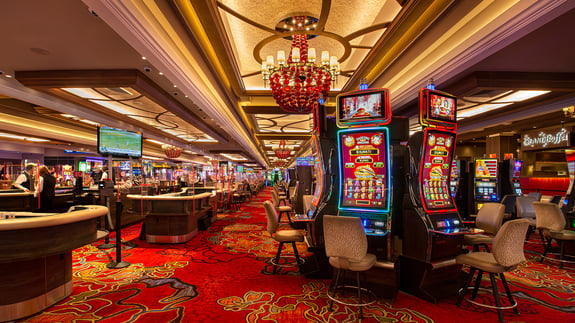
Casino games have long been a significant aspect of human culture, offering not just entertainment but a fascinating reflection of our aspirations, dreams, and fears. From the spinning reels of a slot machine to the skill-based strategies of poker, these games encapsulate a spectrum of human sentiments and experiences. At their core, casino games are not just a chance to win money; they are a microcosm of life itself, where risk and reward converge and luck can change in an eye blink.
As players convene around tables or sit in front of brightly lit machines, they engage in a ritual that transcends mere playing. These games reflect our instinctive desires for relationships, adventure, and the pursuit of luck. They also disclose deeper truths about human psychology, such as our relationship with luck and the adrenaline of uncertainty. In exploring casino games, we reveal not only the rules of play but also the intricate pattern of the human experience, showcasing our woven narratives of aspiration and reality.
The Psychology of Gambling
Wagering is intrinsically connected in the psyche of individuals, appealing to various feelings and desires. The thrill of risk-taking is a core aspect that draws players in, be it the thrill of spinning a roulette or the excitement of drawing a winning card in poker. This rush of adrenaline is often compared to other forms of excitement, as the unpredictability of outcomes elicits a unique psychological response. Gamblers often become entranced by the chance of winning big, leading to an almost magnetic draw toward casino games.
Additionally, an essential component of the psychology behind gambling is the concept of hope and ambition. Participants often nourish dreams of financial freedom and the luxurious lifestyle that can follow winning. This optimism fuels their ongoing participation in casino games, as it provides a sense of meaning and the belief that a life-changing win could be just one bet away. The narrative of overcoming odds and finding success resonates with many, strengthening their dedication to play and engage with these games.
Lastly, social dynamics play a significant role in gambling psychology. Casino environments are designed to promote social interaction, where gamblers gather to share the journey of wins and losses. This shared aspect not only amplifies enjoyment but also influences behavior, as individuals often mimic the actions of others around them. The collective approval found in mutual thrill can enhance the emotional experience, making casino games a reflection of not just personal desires but also collective engagement within the gaming community.
### Risk and Reward: A Double-Edged Sword
Casino games embody the fragile balance between risk and gain that resonates profoundly with the human experience. The excitement of placing a bet is often accompanied by a jolt of energy, as gamblers are confronted with the prospect of winning big, yet conscious of the potential to suffer losses. This twofold experience reflects a fundamental aspect of life: the paths we choose often come with inherent risks, and the quest for benefit can drive us to make risky moves we might not otherwise consider. In this way, casino games echo real-world choices, enticing gamblers to risk not just their funds, but also their aspirations.
The allure of jackpot prizes and payouts fuels a wave of hope, encouraging gamblers to imagine a better future that could arise from a fortunate turn of the roulette or flip of a card. This positive outlook can compel individuals to engage in greater risks, urging them to push their boundaries in search of economic benefit. However, just as in life, the consequences of these decisions can lead to both triumph and loss. The narratives of both jackpot winners and those who have suffered everything at the casino demonstrate the random nature of chance and its significant impact on our futures.
Ultimately, the interaction of engaging with gambling activities serves as a potent reminder of the human condition. Every game played is loaded with the tension of uncertainty, as players weigh the rewards against the risks. This dynamic not only highlights the thrill that comes with gambling but also reveals the vulnerabilities that come with the longing for more. As we navigate the complexities of choice and consequence in both the casino and in life, we find that the pursuit of risk and reward shapes our character and experiences in deep ways.
Society and Isolation in Casino Environment
Gambling culture is a special blend of communal engagement and personal pursuit, reflecting the tensions of individual experience. Gamblers often gather around games, sharing in the excitement of the action, celebrating wins, and commiserating over losses. This social aspect is essential, as it establishes a sense of community and camaraderie among varied groups of people. Regular visitors to casinos may build friendships and establish routines, turning the gambling venue into a second home where they experience linked to a greater community of players.
However, the allure of gambling games can also result to isolation. As individuals become engrossed in the excitement of gambling, they may isolate from personal relationships or neglect to interact with the world outside the gaming space. For some, the search of a windfall can overshadow real relationships, leading to isolation. The situation of being surrounded others yet experiencing solitary is not uncommon, as the attention shifts from shared enjoyment to the individual stakes of each individual’s journey.
This interplay of community and isolation creates a vivid tapestry that defines casino culture. It highlights the intricacy of human interactions, where joy and sorrow exist together. Casinos serve as both a sanctuary for social interaction and a stage for individual challenges, illustrating how intimately entwined our desire for connection and the individual quest for fortune can be. In navigating this landscape, players confront their own stories—seeking both the thrill of the wager and the fellowship of fellow players, ultimately mirroring the wider spectrum of individual experience. SV88
